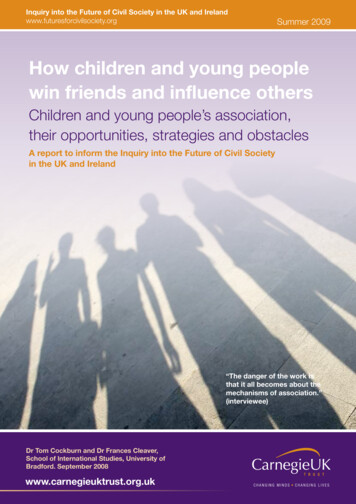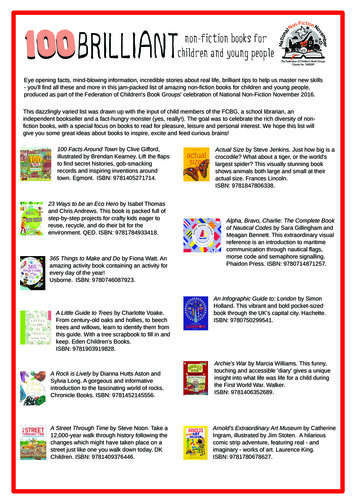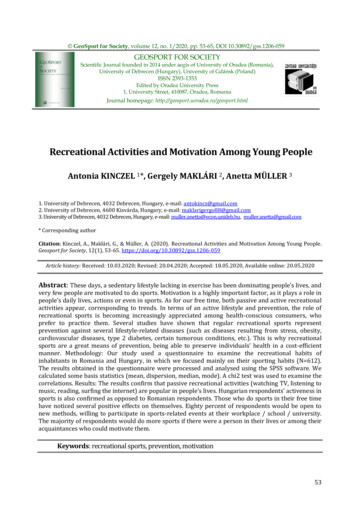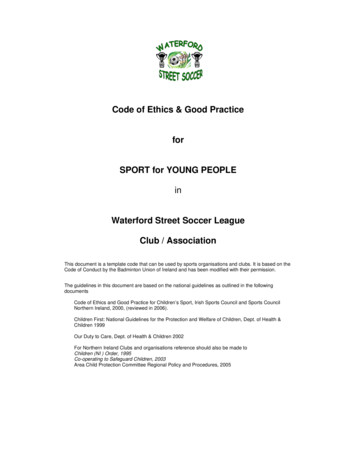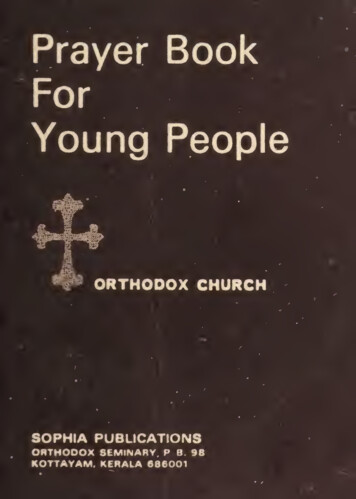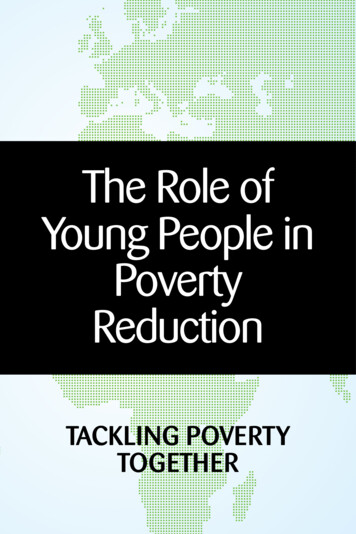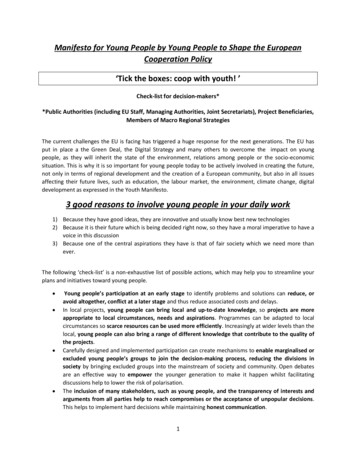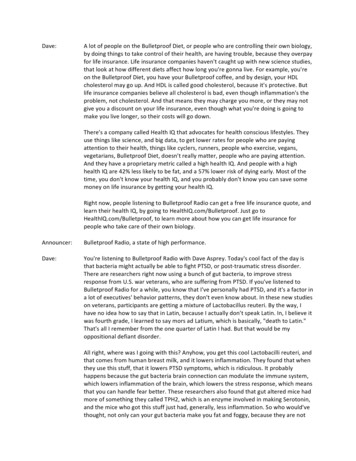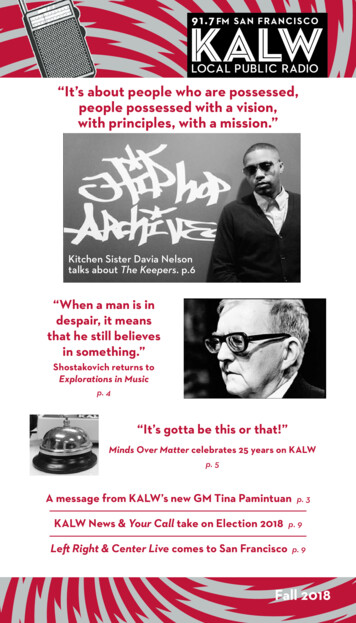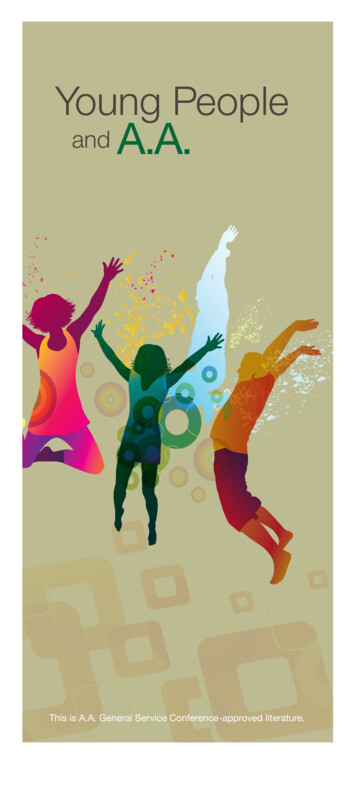
Transcription
Young PeopleandA.A.This is A.A. General Service Conference-approved literature.4 Young People & AA.indd 22/27/20 12:02 P
Alcoholics Anonymous is a fellowship of men andwomen who share their experience, strength andhope with each other that they may solve theircommon problem and help others to recoverfrom alcoholism. The only requirement for membership is adesire to stop drinking. There are no dues orfees for A.A. membership; we are self-supportingthrough our own contributions. A.A. is not allied with any sect, denomination,politics, organization or institution; does not wishto engage in any controversy; neither endorsesnor opposes any causes. Our primary purpose is to stay sober and helpother alcoholics to achieve sobriety.Copyright by AA Grapevine, Inc.,reprinted with permission.Copyright 2017by Alcoholics Anonymous World Services, Inc.All rights reserved.Mail address:Box 459, Grand Central StationNew York, NY 10163www.aa.orgXXM – 2/20 (Ripon)4 Young People & AA.indd 22/27/20 12:02 P
4 Young People & AA.indd 3Young People and A.A.2/27/20 12:02 P
4 Young People & AA.indd 42/27/20 12:02 P
Too young?Coming into A.A. as young people, we foundthat there were common challenges to face. Inthe beginning, we often felt we were too youngto be alcoholics. Some of us didn’t drink for along time; others didn’t drink hard liquor, stumble around, or forget what we did or said whendrunk. Being young in the ever yday world weface peer pressure, stressful relationships withour parents, and parties being a way of life. InA.A., we often feel different because we may bethe youngest person in our group, and some haveeven had an uninformed older member discourage us by saying things like “I spilled more boozethan you drank.”These are hard realities for young people inA.A. On the other hand though, by sticking withit and finding younger and older members tohelp us, we’ve found a solution to our drinkingproblems. In A.A. we’ve found a way of life thathelps us deal with everyday stress and peer pressure, and that life is better and more fun withoutalcohol. We’ve also seen that we develop closerrelationships the longer we stay sober. To us,it doesn’t matter how old you are, how much,where, or what you drink. What matters is howalcohol affects you. You are the best judge ofwhether or not you have a problem. And youknow this from your gut — whether you feelguilty, lonely, ashamed, or whether alcohol isinterfering in your life. (The questions at the endof this pamphlet may also help you decide.)If drinking is causing you trouble, and youwant to stop but can’t seem to do it on your own,give Alcoholics Anonymous a try — try it for 90days, and if your life doesn’t get better, at leastyou’ll better understand your options.All of us felt strange about going to A.A. Butwe now see that A.A. saved our lives — and is thebest thing that ever happened to us. We also nowknow that there are many members who are ourage — in fact, approximately 10% of A.A. members are under the age of 30.4 Young People & AA.indd 552/27/20 12:02 P
Where do I find A.A.?Many of us found A.A. in our hometowns by looking up Alcoholics Anonymous in the telephonebook or on the Internet. Others got the wordfrom a school counselor, doctor, relative or friend.Or, we were introduced to A.A. by a judge, orwhile we were in a hospital or detox. Some of usread about A.A. in the newspaper, or heard aboutit on radio or TV.For information about A.A. in any given area,we can write to Box 459, Grand Central Station,New York, NY 10163 (that’s the A.A. GeneralService Office, or G.S.O), or visit G.S.O.’s website: www.aa.org.There are several kinds of A.A. meetings:Open meetings are open to anyone, alcoholicor not, who is interested in A.A. At open meetings you will hear stories like the ones in thispamphlet.Closed meetings are limited to those who havea drinking problem (or think they may have).Here, we are free to speak up and ask questions.At closed meetings we often hear practical suggestions on staying sober.At beginners meetings, we discover that weare on the same level with anyone who is newto A.A. Even if there’s a business executive or agrandmother next to us, we’re all starting fromscratch together, tackling the basics of A.A.Some communities have young people’sgroups. You can find these groups in local meeting lists, or by asking other young members.Young members can attend any meeting, and asyou’ll see in our stories, a bond of understandinglinks alcoholics of all ages and circumstances.Young people’s conferences are held in theUnited States and Canada and around the world.For information, consult your local A.A. area,intergroup office, or search online for YPAA.64 Young People & AA.indd 62/27/20 12:02 P
How do we stay awayfrom drinking?We go to A.A. meetings as often as we can. Fromhearing the stories, we realize we are not unique.We learn to identify with the feelings of thespeakers and not compare the outer facts of ourstory with those of others.We also read A.A. literature such as the pamphlet Too Young, the booklet Living Sober, andthe books Alcoholics Anonymous and Twelve Stepsand Twelve Traditions. (Other valuable A.A. literature is listed at the end of this pamphlet.)We reach out to other members — talkingto others before and after meetings, and on thetelephone.We change ourselves, gradually, day to day.We help other alcoholics. And by helping, we staysober, sane and happy.In this pamphlet, there are A.A. stories, personal experiences of young members like us. Wehope they will help you find your way.4 Young People & AA.indd 772/27/20 12:02 P
TinaShe joined A.A. at 13“If I could have stayed cool,I’d still be drinking.”I loved how alcohol affected me. It numbed allthe torment in my brain. I had new friends, theolder kids. I was cool, finally!If I could have stayed cool, I’d still be drinking.Very quickly, though, I started getting into trouble. Going to sixth grade was getting in the wayof my life, which at this point consisted of gettingdrunk as much as possible.When I was 11, I was put into what I assumedwas a mental hospital. I was relieved that I wascrazy. Crazy is cool. I realized much later that theplace was a rehab.I did resolve at this time that I didn’t want toever be in any institution ever again. I would doeverything in my power not to be locked up.Every time I promised something, I couldn’tfollow up with action. Sometimes I was sincerelygoing to change my ways, and I couldn’t. Now Iunderstand that it was alcoholism. I would promise everything, but I’d never admit that drinkingwas the culprit. If I admitted that, then I wouldhave to stop.I was in a bunch of institutions. The last onewas a group home. I had a choice to go to arehab, but I thought I wouldn’t fit in there (drinking wasn’t my problem; it was my family). I wasterrified when I went to my first A.A. meeting.However, I was told the guys in A.A. were cute, soI went. The speaker talked about how he used todrink at night and pray that he would not wake upin the morning. Then when he came to, his firstthought would be, Dear God, I have to go throughthis another day. He said he felt like the only person in the world who had ever felt that way. I wasaghast because I felt I was the only person in theworld who had ever felt that way. I identified.So I was 13 and going to A.A. meetings.Everyone was older than I was, even most of thekids at the young people’s meetings. But alcoholics in general will find a reason why they don’t84 Young People & AA.indd 82/27/20 12:02 P
belong. It could be religion, it could be class, andit could be race. Mine was age. But I found thatalcoholics understand other alcoholics. It wasupsetting to find alcoholics who understood me,because that meant I was an alcoholic. And if Iwas an alcoholic, that meant my family was right,and that really sucked.I was taken through the Steps, and I foundI had the same experience as everyone else hadwhen they went through the Steps. I have foundthat because of the spiritual principle of anonymity, regardless of how young or old or “special” Iam, in A.A., I’m just a drunk.KevinHe joined A.A. at 14“I loved drinking, and I lovedwhat went with it.”My life was, for the most part, perfect up untilmy first day of school. I had no idea that life hadso many rules. But what I most remember was adevastating feeling that I just did not fit in.I have had two overwhelming spiritual experiences in my life. The second was when I decidedto get sober. The first was when I took my firstdrink. There was this substance inside my body,and I knew that I had to find more. That was thebest drink I ever had — and I would spend mydrinking career trying to recreate it.I loved drinking, and I loved what went withit. I was just as addicted to the lies and the shadypeople and places as I was to the alcohol. Mygrades suffered until I stopped going to schoolaltogether. My friends and family began to scatter. I found myself in places without any idea ofhow I had gotten there. I overdosed on alcohol.At some point, I even decided to run awayfrom home. I left home and proceeded to burnall of the bridges that I could. My family saidthat they were much happier in their house withme not in it. My friends wanted nothing to dowith me. I spent the remainder of my alcoholism homeless, breaking into cars for money, and4 Young People & AA.indd 992/27/20 12:02 P
sleeping on a small bench in a park.My parents managed to track me down andgot me to a rehab. When I was informed that Iwould be in that place for a two-week evaluation,I screamed at my parents and stormed out of theroom. When it became obvious I was probably notgoing to be allowed to leave, I collapsed on thecouch in the middle of the room and began to cry.I had met complete defeat. I was tired of running,ducking, dodging, crawling and hiding. I could gono further. I then realized I was in a safe place.When you are truly ready, God will put all ofthe right people in all of the right places at all ofthe right times. Since that day, I have not foundit necessary to tempt fate again. I have come tounderstand that to do so would be like asking Godto realign the planets one more time just for me.I have been given an opportunity to grow upwith these Twelve Steps in my life. It is with theutmost gratitude that I have just celebrated my19th year of continuous sobriety in A.A., one dayat a time.I can’t be an alcoholic, because I can’t drinktoo much. I get sick.You’ll see some of our stories in this pamphletare about young people who kept on drinking even thoughour stomachs protested. We too are alcoholics.NicoleShe joined A.A. at 14“Anyone old enough to have a problemis old enough to seek help from A.A.”At 12 years old, alcohol had already stoppedworking for me. I had been drinking for fouryears and had lost whatever ability I once had tocontrol when and how much I drank.104 Young People & AA.indd 102/27/20 12:02 P
Two years later, I was institutionalized foralcoholism and drug addiction. All the pain andsuffering I had experienced made me willing toadmit I had a problem.Both my parents had been sober in AlcoholicsAnonymous since before I was born, so I knewA.A. held the solution to alcoholism. What I didn’tknow was that anyone old enough to have a problem is old enough to seek help from A.A.My treatment center began holding meetings every week shortly after I arrived. When Ireturned home and started going to meetingsaround there, I felt out of place. I was muchyounger than ever yone else and could not seehow anyone else could understand what it waslike to be me.That changed one night when I heard an olderman share. Though his experiences were muchdifferent from mine, I recognized the feelings. Itwas the first time I heard my story in a meeting.I hear parts of it now in nearly every person whoshares. That unity kept me coming back.After I had been sober a while and had workedthe Steps, I began to sponsor other women, someyounger and some much older.I spoke with the drug and alcohol counselorat my school, who then put three girls havingtrouble with alcohol in touch with me. I watchedthem experience the same things I did at A.A.meetings. Today, my group still consists primarily of older men, and I am still the youngest one,though nobody seems to notice. We are all equal.Today, I am 16. I still run into people whothink that I am too young for A.A., but I understand now that our differences, especially age,are insignificant in comparison to what A.A. isdoing for us.I am the secretary of meetings, and I attendconferences and sponsor newcomers, just likeany member. I thank my group for acceptingme as I am, for its Traditions and principles thatenable me to be here, and my Higher Powerfor getting me here. I ask ever y newcomer toremember to overlook the ways they might bedifferent, and every oldtimer to do the same.4 Young People & AA.indd 11112/27/20 12:02 P
GwenShe joined A.A. at age 15“I just didn’t know how to stop,or what I would do if I did.”Drinking caused so much trouble in my familythat I promised myself I would never drink. Myparents didn’t get along. They’d fight and we kidswould be real scared. I prayed that they’d quitdrinking and fighting, but they never did.When I was 11 years old, my mother died, andI was sent to live with my grandmother. Therewas no drinking at her house. She was very strictand religious, but I didn’t mind. It felt good to besomeplace quiet and safe.A cousin around my age also lived with grandmother. She had a lot of friends and they letme hang out. I remember we were at this kid’shouse, after school, and he took a six-pack outof the refrigerator. I was scared, but I took a biggulp just to show that I knew what I was doing. Iwas surprised — I liked it.I started to feel high — everybody was laughing and dancing around. I felt so good, and Ihadn’t even known that I felt bad before I drank.My cousin and I then spent just about every dayat that kid’s house drinking beer.Things star ted
thought would be, Dear God, I have to go through this another day. He said he felt like the only per-son in the world who had ever felt that way. I was aghast because I felt I was the only person in the world who had ever felt that way. I identified. So I was 13 and going to A.A. meetings. Everyone was older than I was, even most of the kids at the young people’s meetings. But alcohol-ics in .
